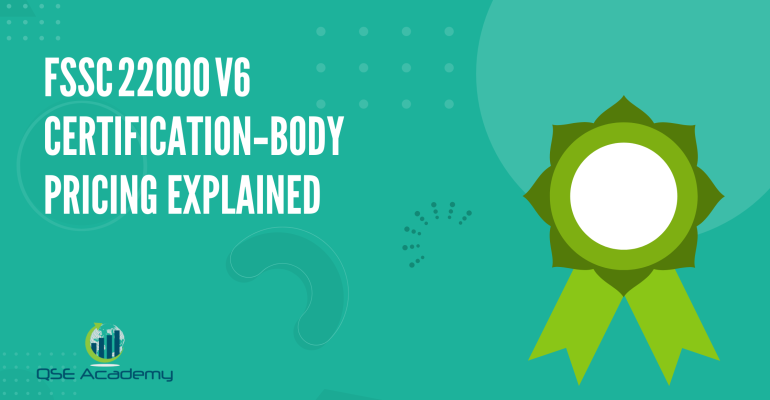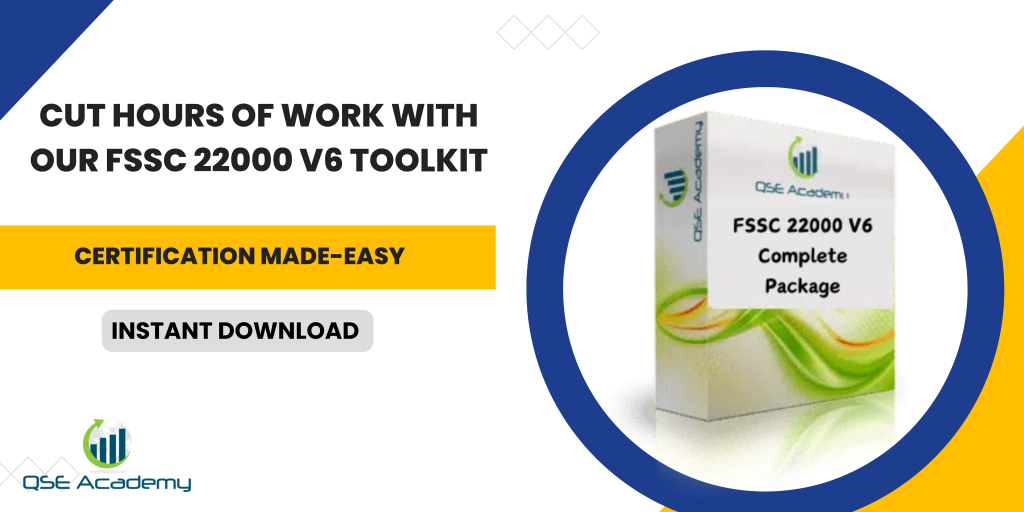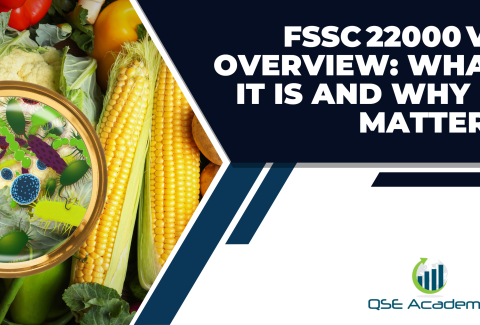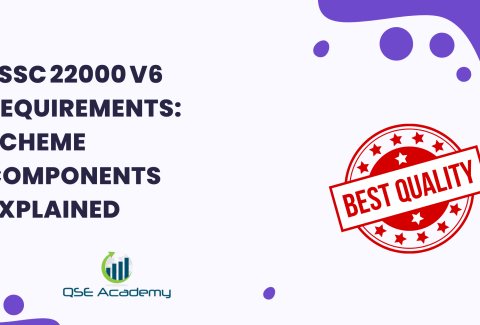FSSC 22000 V6 Certification‑Body Pricing Explained
Understanding the Real Cost of FSSC 22000 V6 Certification
When clients ask, “How much will FSSC 22000 V6 certification cost us?” my honest answer is: it depends—but it’s not as mysterious as it seems.
After working with hundreds of food manufacturers and distributors worldwide, I’ve seen how certification-body pricing is structured, what drives costs up, and how companies can keep expenses under control without cutting corners.
In this guide, you’ll get a clear breakdown of what certification bodies charge for, the biggest pricing mistakes to avoid, and a few insider tips to help you budget smarter.
How Certification Bodies Calculate FSSC 22000 V6 Costs
Here’s how it usually works.
Accredited certification bodies follow the IAF MD 5 rules, which determine how many audit man-days your company needs. They calculate this based on factors like employee count, complexity, and risk category.
So, the total cost generally includes:
- Audit man-days (the biggest chunk)
- Auditor travel and accommodation
- Document review fees
- Certification and accreditation fees
- Annual surveillance visits
Here’s what I’ve noticed: many companies receive quotes that look similar—but the fine print changes everything. Some include travel costs; others add them later.
Pro Tip: Always ask for a transparent quotation that lists every element—especially the estimated number of audit days.
Common Mistake: Accepting a flat rate without clarity. That “bargain” quote can grow fast when travel or re-audit fees show up later.
 Factors That Influence FSSC 22000 V6 Pricing
Factors That Influence FSSC 22000 V6 Pricing
No two certifications cost the same. Your price depends on your:
- Scope of certification (manufacturing, storage, catering, etc.)
- Company size and structure
- Number of sites
- Product categories
- Geographical location
A small, single-site coffee roaster might spend $5,000 – $7,000 on certification. A multi-site frozen-food manufacturer? Closer to $20,000 – $30,000 over the full cycle.
Here’s the truth: the more complex your operation, the longer the audit—and the higher the bill.
Pro Tip: Define your scope carefully before requesting quotations. Overstating your activities can unnecessarily increase audit days.
One client in Malaysia saved nearly 30% simply by clarifying that two of their facilities were storage-only, not full production sites.
Comparing Certification Bodies: Price vs. Value
It’s tempting to choose the lowest quote. But in my experience, the cheapest certification body often ends up being the most expensive in the long run.
I once worked with a food packaging firm that switched to a cheaper provider. Within a year, they faced repeated non-conformities, inconsistent auditor feedback, and extended corrective-action reviews. The time and stress alone wiped out their savings.
When comparing certification bodies, look beyond the number:
- Auditor experience in your sector
- Responsiveness during audits
- Support for multi-site or remote audits
- Reputation with your accreditation body
Pro Tip: Ask the CB to share references from companies in your industry. It’s a simple way to gauge their competence and consistency.
If the CB hesitates to provide them—that’s your red flag.
Annual and Hidden Costs in FSSC 22000 V6 Certification
Getting certified isn’t a one-time cost—it’s a three-year cycle.
That means you’ll face annual surveillance audits, document reviews, and eventual recertification. Most businesses forget to budget for those.
Common hidden costs include:
- Travel and accommodation for auditors
- Re-issuance of certificates after updates
- Fees for additional auditors (especially for large sites)
- Time spent preparing corrective actions
Common Mistake: Assuming that the certification fee covers everything for three years. It doesn’t.
Pro Tip: Treat certification as an ongoing investment, not a single project. Build it into your compliance budget.
Smart Ways to Optimize or Reduce Certification Costs
Over the years, I’ve seen smart managers cut their certification expenses without compromising quality. Here’s how they did it:
- Do a Gap-Analysis First
Identify non-conformities early. That way, your CB won’t need extra review time later. - Integrate Standards
If you’re also certified to ISO 9001 or HACCP, ask if the CB can combine audits. Shared man-days mean shared costs. - Centralize Documentation
A digital QMS or document-control system saves hours during audits. - Negotiate Multi-Site Sampling
If you run similar facilities, ask for sampling instead of full-site audits.
Example: A seafood exporter using ISO 14001 alongside FSSC 22000 negotiated a joint audit and saved 25% in total costs.
Pro Tip: Before signing any contract, confirm that the CB supports multi-standard or blended audits under IAF guidelines.
What to Watch Out For in Certification Contracts
Most companies skim through the contract—but that’s where the hidden traps are.
Pay attention to:
- Audit cancellation and postponement fees
- Policies for certificate suspension or withdrawal
- Clauses about additional charges for corrective-action reviews
- Transition terms for future revisions (e.g., from V5.1 to V6)
Pro Tip: Always request the CB’s certification agreement template before committing.
It’s better to clarify now than argue later about “extra charges” that weren’t disclosed.
FAQs: FSSC 22000 V6 Pricing Questions Answered
Q1. Is there a fixed global price for FSSC 22000 V6 certification?
No. Pricing depends on your company size, risk level, and location. CBs use the IAF MD 5 guide to calculate audit days, but rates per day vary.
Q2. Can I change certification bodies if their fees rise?
Yes, you can transfer. Just be ready for a transition audit and provide your previous audit reports.
Q3. Are consultancy and certification the same thing?
No. Consultancy (like documentation or training) helps you prepare for certification, but only accredited CBs can issue your FSSC 22000 certificate.
Conclusion: Focus on Value, Not Just Price
Understanding how certification-body pricing works gives you power—the power to negotiate fairly and budget wisely.
When you know what drives costs, you’ll recognize when a quote makes sense and when it doesn’t.
At QSE Academy, we’ve helped businesses of all sizes prepare for FSSC 22000 V6 audits efficiently, often reducing audit duration and rework.
If you’d like help comparing certification quotes or preparing documentation that speeds up approval:
Melissa Lavaro is a seasoned ISO consultant and an enthusiastic advocate for quality management standards. With a rich experience in conducting audits and providing consultancy services, Melissa specializes in helping organizations implement and adapt to ISO standards. Her passion for quality management is evident in her hands-on approach and deep understanding of the regulatory frameworks. Melissa’s expertise and energetic commitment make her a sought-after consultant, dedicated to elevating organizational compliance and performance through practical, insightful guidance.








